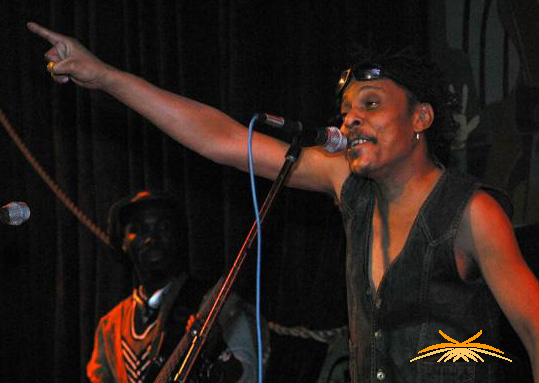
Y-e-e-pa!
Is this Majek Fashek? No, no, he can’t be. I can’t see this alone!” Pulling his eyelids with two fingers, obviously to get a clearer picture of the spectacle, the woman, who was simply known as Mama Tayo, exclaimed as she sprinted out of her room to alert neighbours of the wondrous sight.
No doubt, she might not have met Majekodunmi Fasheke, the reggae singer and guitarist, who is popularly known as Rainmaker, in person in his hey-days, but it cannot be gainsaid that the musician’s name once rang a bell in her household. Within seconds, about four of her neighbours hurriedly showed up mostly in loose wrappers, to behold Majek on the television with their mouths ajar in consternation. The whole drama took place in a face-me-I-face-you apartment in Ilupeju, Lagos on October 1, 2009.
He was among Nigerians who appeared on the television programme that spotlighted how people celebrated the nation’s independence anniversary that day. Shell-shocked at the sight of Majek’s emaciated looks, Mama Tayo’s “emergency” guests could not help but ask themselves questions as to how the tide had progressively gone rough for the man who had, with his chosen career, gladdened their souls with edifying lyrics.
Majek was born by an Igbo mother to a Yoruba father. He had claimed times without number that he was born with dreadlocks, the so-called holy hairstyle of Rastafarians. He grew up in the hinterland of Benin City, Nigeria, where, as reports had it, he had a rather unpalatable childhood. Perhaps only God knows what would have become of him in later years if not for the ample solace he found in the soothing dispositions of his mother, brother and sister, all staunch members of the Aladura Church, who turned his guiding angels.
Luckily, he weathered the storm and as he grew up in a fervently religious family, he was exposed to the imported music of legendary Bob Marley at an early age, and he made no pretence about it.
Then up-and-coming, personable Majek first slammed his feet on the ladder of fame through a television show in the early 1980s. Then, he was a member of a Benin-based reggae group called Jastix. In the band with him included Ras Kimono, another sensational reggae musician, and Amos McRoy Gregg. That their future held promise for them was not open to contest, even to the hardest cynic.
For years, in company with a fellow reggae ensemble, The Mandators, he was on playing tours. In 1987, shortly after Jastix disbanded, he opted for a solo career and almost immediately, he became the most celebrated reggae singer in the country. His song, Send down the rain, was an instant hit, which won for him, six US-based PMAN Music Awards among others. In the height of his “reign” in the music arena, he was variously known and addressed as “High priest who does not lie.” As he ruled the airwaves, the doors of almost every higher institution in the country were thrown open for him as “Yo yo yo yo papayo, send down the rain” was, without exaggeration, more popular than the national anthem on the lips of even primary school pupils.
He was once on the label of Tabansi Records, where he left to sign to CBS Nigeria in the early 1990s before he moved to Island Records’ Mango imprint, a label that was noted for marketing reggae internationally. His first album for the company included a cover version of Bob Marley’s “Redemption Song”. In 1990, he was signed to Interscope Records, an American label, and released Spirit Of Love, produced by “Little Steven” Van Zandt. Flame Tree hit the scene with The Best of Majek Fashek in 1994. He has recorded several albums for various labels since, including Rainmaker for Tuff Gong (1997) and Little Patience for Coral (2004).
However, in a manner that still seems a mystery to his fans, the attendant euphoria of his rise to stardom was to soon become history, specifically after his successful deal with Interscope, his fortunes headed for the rocks as rumours spread across the globe that he had found love in hard drugs in America, where it appeared he had relocated about three years ago.
While he was out of circulation musically, the only poser on the lips of many was: “Where is Majek Fashek? Or what is he doing in America where he is said to be living now?”
But not long ago, 2006, he attempted to erase the blot from his escutcheon in an interview where he declared inter alia: “I am not crazy. And I don’t have a drug problem. I do have an alcohol problem. It is not because I like to drink. When my mother died, I felt a part of me left with her. To lose someone so dear and so close to you can be extremely painful. In an attempt to come to terms with this loss, alcohol became a chosen part to communicate my pains to her and also to journey into a mystical world. My mother was my strength. She still is…”
The face-saving statement notwithstanding, his worried fans would not heave any sigh of relief, no thanks to the fact that he had stayed put in God’s Own Country. The fact that his fans were not the only ones suffering sleepless nights became public knowledge when the Edo State Governor, Comrade Adams Oshiomhole, as widely reported, promised to come to his rescue during his first Workers’ Day celebration on May 1, 2009. It was at the Samuel Ogbemudia Stadium, Benin City.
Majek’s person was there! Guests’ voices rose in hearty applause for his performance when he held the microphone to “do the thing again.” Said to be clad in his trademark hat, blazer and key-holder for an earring, with a low-profile chain dangling on his neck, he was in his trademark ghetto regalia, looking every inch a ghost of his old robust self.
On the governor’s order, it was gathered that he had since sealed a medical appointment with the state’s Health Commissioner, Dr. Moses Momoh, as the template for the rehabilitation gesture of the governor.
Now, as this reporter gathered on Thursday after several failed attempts to link with him on phone, he is back in New York, where his family resides.
As many would rightly presume, he now waits on God for the success of the intervention of the likes of Oshiomhole for him to throw away his “crutches,” bounce back and rule his musical world and “make the rain” again. But the reality is, he was once there!



















